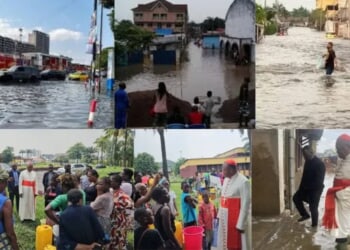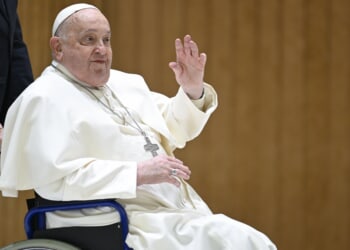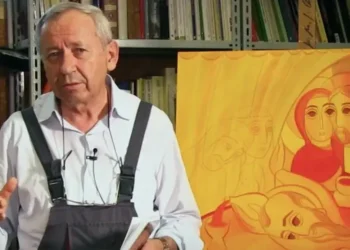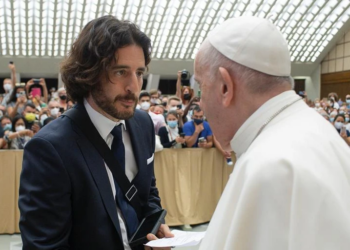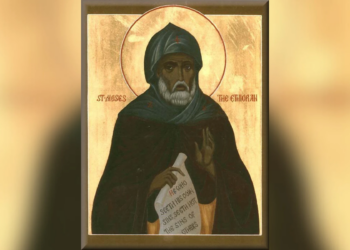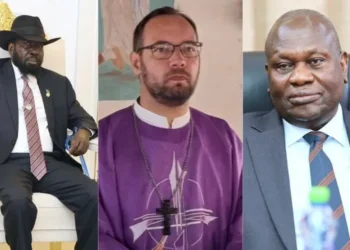Manila, Philippines, Apr 27, 2025 /
06:00 am
The Philippines will make history this year on April 27, Divine Mercy Sunday, by becoming the first nation in the world to consecrate itself entirely to Jesus through divine mercy.
In 2016 at the Pan-African Congress on Divine Mercy Sunday in Rwanda, bishops in Africa consecrated the continent itself to divine mercy. However, the Philippines is the first singular nation to do so.
“This is remarkable; this is really unprecedented. Never has this been done before in the history of the world — a country consecrating themselves to the divine mercy,” said Father James Cervantes of the Marians of the Immaculate Conception (MIC), a congregation devoted to spreading the message of divine mercy. “I believe the bishops are being inspired by the Holy Spirit to lead our country to holiness.”
The bold initiative began with a single spark — a heartfelt letter from Cervantes to bishops across the country calling for a nationwide consecration to divine mercy. Dioceses responded enthusiastically, and soon the idea spread like wildfire.
The Permanent Council of the Catholic Bishops’ Conference of the Philippines (CBCP) gave its official approval, declaring that a national consecration to divine mercy will take place during all Masses on April 27 as part of the 2025 Jubilee Year celebrations.
Cardinal Pablo Virgilio David, president of the CBCP, issued a statement calling on all dioceses, parishes, religious communities, and Catholic institutions to participate in this landmark spiritual initiative.
“This nationwide consecration will be a profound expression of our trust in the divine mercy — a trust that remains our final refuge in these times of uncertainty and trial,” David said. “As Our Lord Jesus said to St. Faustina, ‘I desire that my mercy be worshipped, and I am giving mankind the last hope of salvation; that is, recourse to my mercy.’”
He described the national act of consecration as a “collective response of faith and hope” amid grave challenges facing the country and global community today — such as the threat of global war, widespread corruption, the erosion of truth, and persistent opposition to Church teachings on life and family.
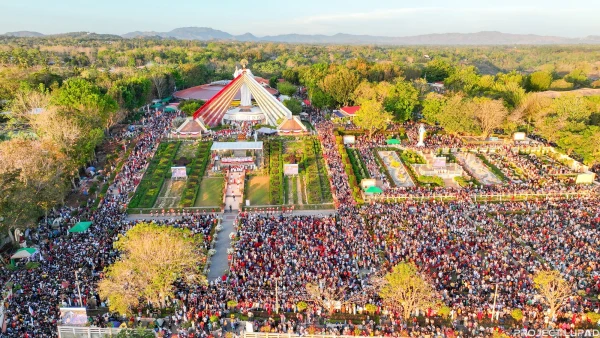
The consecration will take place during all Masses across the country on the second Sunday of Easter, which is also called Divine Mercy Sunday. The Prayer of Consecration to the Divine Mercy will be recited in place of the general intercessions.
“It’s not just about reciting a prayer,” Cervantes told CNA. “It’s about being properly disposed — understanding what it really means to consecrate ourselves as a nation to the divine mercy. In the Diary of St. Faustina, Jesus says, ‘Gather all sinners from the entire world and immerse them in the abyss of my mercy.’”
“A consecration means to offer yourself completely and totally to God. It is an act of surrender — total surrender — to God and his will. This is very radical, it’s very transformative. It means we are denying our own selfish plans, selfish wills, and selfish desires so we can give ourselves totally and completely to God,” he said.
“And we are doing this as a nation. A national consecration. A national offering of ourselves totally and completely to God.”
The heart of the consecration lies in radical trust — the trust Jesus repeatedly asked of St. Faustina in her revelations.
“What we are saying is that we as a nation entrust ourselves to you. We as a nation place ourselves into your hands. We as a nation are at your disposal,” Cervantes said.
He continued: “We are doing this because this is what Jesus wants from us. In the ‘Diary of St. Faustina,’ Jesus says, ‘I desire trust from my creatures. Souls that trust boundlessly are a great comfort to me because I pour out all the treasures of my graces into them.’ So imagine an entire nation that trusts completely in God. It will receive treasures of his graces.”
(Story continues below)
Subscribe to our daily newsletter
To help prepare Filipinos for this sacred moment, Cervantes launched a 14-part video series on the Marian Helpers Philippines Facebook page, intending “to form the whole nation in preparation for the national consecration to divine mercy.” He emphasized the importance of preparing well for a consecration to avoid mere lip service.
“Sad to say, many Catholics no longer receive the sacraments. Many haven’t gone to confession in years,” he said. “But If you think about the first words of the novena to divine mercy, Jesus says, ‘Today bring to me all mankind, especially all sinners, and immerse them in the ocean of my mercy.’ Those are our marching orders from the Lord. He wants us to bring to him all mankind, especially all sinners, and immerse them in the ocean of his mercy so we can really be renewed as a nation, as a country.”
“Can you imagine a country that trusts entirely in God’s mercy? Can you imagine the graces that God will pour out on such a country that trusts completely in his mercy? If our nation trusts completely in God, we will be abundantly blessed with many graces from his infinite mercy,” Cervantes said.
The divine mercy message and devotion has been called the largest grassroots movement in the history of the Catholic Church — and it is especially popular in the Philippines.
The island country hosts the largest divine mercy celebration in the world, drawing over 57,000 pilgrims from across Asia at the archdiocesan Shrine of Divine Mercy in Misamis Oriental, Philippines. For comparison, the Sanctuary of Divine Mercy in Krakow, Poland, receives 25,000 pilgrims from around the world, while the National Shrine of Divine Mercy in Stockbridge, Massachusetts, where the Marian Fathers are headquartered, welcomes 20,000 to 25,000 pilgrims on Divine Mercy Sunday.
As the Philippines prepares for this historic act of consecration, it does so with extraordinary faith that the devotion to divine mercy is more than a popular piety — it is, as St. John Paul II would always say, “the answer to the world’s problems.”








